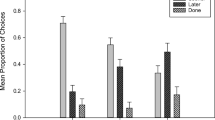Abstract
The proposition that learner control of instruction can be facilitated by directly affecting the student’s perception of learning need was investigated. Students in one experimental condition were continuously advised during instruction of their learning performance and needs (amount and sequence of content) in relationship to the desired acquisition of rules at a given mastery criterion and were allowed to make instructional decisions. It was hypothesized that this condition would prove more effective on posttest performance than conditions without advisement — either partial learner control or conventional learner control. Results are discussed in reference to an information-processing approach to the design of computer-based instruction.
Similar content being viewed by others
References
Anderson, J. R.Language, memory and thought. Hillsdale, N.J.: Erlbaum, 1976.
Anderson, J. R.Cognitive psychology and its implications. San Francisco: Freeman, 1980.
Bruner, J. S. On perceptual readiness.Psychological Review, 1957,64, 123–152.
Dale, E., & Chall, J. S. A formula for predicting readability: Instructions.Educational Research Bulletin, 1948,27, 11–20; 37–54.
Deutsch, J. A., & Deutsch, D. Attention: Some theoretical considerations.Psychological Review, 1963,70, 80–90.
Gibson, E. J. Improvement in perceptual judgments as a function of controlled practice or training.Psychological Bulletin, 1953,50, 401–431.
Glaser, R.Adaptive education: Individual diversity and learning. New York: Holt, Rinehart and Winston, 1977.
Greeno, J. G. Trends in the theory of knowledge of problem-solving. In D. T. Tuma and R. Reif (Eds.),Problem-solving and education: Issues in teaching and research. Hillsdale, N.J.: Erlbaum, 1982.
LaBerge, D. Perceptual learning and attention. In W. K. Estes (Ed.),Handbook of learning and cognitive processes. Hillsdale, N.J.: Erlbaum, 1976.
Lindsay, P., & Norman, D.Human information processing. New York: Academic Press, 1977.
Newell, A. Reasoning, problem-solving, and decision processes: The problem space as a fundamental category. In R. Nickerson (Ed.),Attention and performance VIII. Hillsdale, N.J.: Erlbaum, 1980.
Park, O. Example comparison strategy versus attribute identification strategy in concept learning.American Educational Research Journal, in press.
Park, O., & Tennyson, R. D. Adaptive design strategies for selecting number and presentation order of examples in coordinate concept acquisition.Journal of Educational Psychology, 1980,72, 362–371.
Perlmutter, J., Hersip, J., & Myers, J. L. The role of semantic knowledge in retrieval from episodic long-term memories: Implications for a model of retrieval.Memory and Cognition, 1976,4, 361–368.
Raygor, A. L. The Raygor readability estimates: A quick and easy way to determine difficulty. In P. D. Pearson (Ed.),26th Yearbook of the National Reading Conference. Clemson, S.C.: NRC., 1977.
Rothen, W., & Tennyson, R. D. Application of Bayes’ theory in designing computer-based adaptive instructional strategies.Educational Psychologist, 1978,12, 317–323.
Shepp, B. E. Perceptual development. In E. Rosche & B. Lloyd (Eds.),Cognition and categorization. Hillsdale, N.J.: Erlbaum, 1978.
Sniezek, J. A. Judgments of probabilistic events: Remembering the past and predicting the future.Journal of Experimental Psychology: Human Perception and Performance, 1980,6, 695–706.
Steinberg, E. R. Review of student control in computer-assisted instruction.Journal of Computer-based Instruction, 1977,3, 84–90.
Tennyson, C. L., Tennyson, R. D., & Rothen, W. Content structure and instructional control strategies as design variables in concept acquisition.Journal of Educational Psychology, 1980,72, 499–505.
Tennyson, R. D. Evaluation technology in instructional development.Journal of Instructional Development, 1978,2(1), 19–26.
Tennyson, R. D. Instructional control strategies and content structure as design variables in concept acquisition using computer-based instruction.Journal of Educational Psychology, 1980,72, 525–532.
Tennyson, R. D. Use of adaptive information for advisement in learning concepts and rules using computer-assisted instruction.American Educational Research Journal, 1981,4, 425–438.
Tennyson, R. D. Interactive effect of cognitive learning theory with computer attributes in the design of computer-assisted instruction.Journal of Educational Technology Systems, 1982,10, 175–186.
Tennyson, R. D., & Boutwell, R. C. An audio-tutorial instruction approach to individualized college geology.Improving Human Performance, 1974,3(1), 15–21.
Tennyson, R. D., & Breuer, K. Application of video and computer technology in course design for higher education. In O. Zuber-Skerritt (Ed.),Videology—The use of videotape and interactive videodisc technology in higher education. London: Routledge & Paul, in press.
Tennyson, R. D., & Buttrey, T. Advisement and management strategies as design variables in computer-assisted instruction.Educational Communication and Technology Journal, 1980,28, 169–176.
Tennyson, R. D., Chao, J. N., & Youngers, J. Concept learning effectiveness using prototype and skill development presentation forms.Journal of Educational Psychology, 1981,73, 326–334.
Tennyson, R. D., & Rothen, W. Pretask and ontask adaptive design strategies for selecting number of instances in concept acquisition.Journal of Educational Psychology, 1977,64, 586–592.
Tennyson, R. D., & Rothen, W. Management of computer-based instruction: Design of an adaptive control strategy.Journal of ComputerBased Instruction, 1979,5, 63–71.
Wickelgren, W. A.Learning and memory. Englewood Cliffs, N.J.: Prentice-Hall, 1977.
Wickelgren, W. A.Cognitive psychology. Englewood Cliffs, N.J.: Prentice-Hall, 1979.
Author information
Authors and Affiliations
Additional information
This study was sponsored in part by Research Grant No. 82T101 funded by the Department of Educational Systems Research and Development, Control Data Corporation, Minneapolis, Minnesota. At the time of manuscript preparation, the second author was a Fulbright Research Scholar at the Institut fur Erziehungswissenschaft of the Rheinisch-Westfalischen Technischen Hochschule, Aachen, West Germany.
Rights and permissions
About this article
Cite this article
Johansen, K.J., Tennyson, R.D. Effect of adaptive advisement on perception in learner-controlled, computer-based instruction using a rule-learning task. ECTJ 31, 226–236 (1983). https://doi.org/10.1007/BF02766635
Issue Date:
DOI: https://doi.org/10.1007/BF02766635




